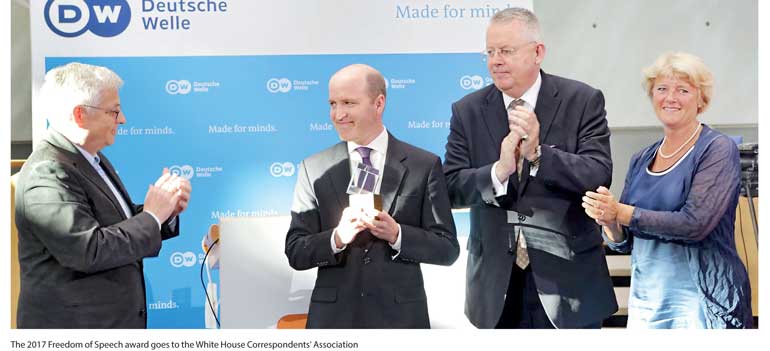Saturday Feb 28, 2026
Saturday Feb 28, 2026
Friday, 30 June 2017 00:00 - - {{hitsCtrl.values.hits}}

 Journalists, politicians and activists debated issues of identity and diversity for three days in Bonn last week at the Deutsche Welle 2017 Global Media Forum.
Journalists, politicians and activists debated issues of identity and diversity for three days in Bonn last week at the Deutsche Welle 2017 Global Media Forum.
“Ten years ago, we held the first Global Media Forum (GMF) here in Bonn – inwhat were relatively calm times,” said DW’s Director General, Peter Limbourg, in his opening address. That was before the financial crisis and the bloody collapse of large parts of the Arab world, before refugees started moving into Europe in large numbers, and before the war in Ukraine, he added. “Nationalism was but a fringe aspect, Donald Trump had a TV show but no nuclear missiles, and but a small minority was dreaming of a Brexit.”
Times today are more tumultuous, Limbourg said, and that “affects the work of journalists, and foreign broadcasters in particular.” There is a direct correlation between the level of national oppression and the use of international broadcasters, the head of DW told the conference. “Broadcasters that are seen to be reliable are at an advantage.”
This year, the focus is on the digital future in the workplace, GMF Director Patrick Leusch said: “Journalism is caught in a huge bubble, everyone is sender and receiver, and the big question is, how can we still be credible?” Leusch said.
Credibility is the very issue panelists are discussing at the start of the congress – “Theproliferation of lies – mediain the post-truth political era” - and it is bound to crop up again over the course of the forum meetings in discussions on filter bubbles and the rise of populism.
Around 2,000 guests from 130 countries attended about 40 events, ranging from small workshops on private formats by invitation only to large forum presentations. Participants included international decision-makers like European Parliament Secretary-General Klaus Welle, UNESCO deputy director general Frank La Rue, businessman and Kremlin critic Mikhail Khodorkovsky, Amnesty International Secretary-General Salil Shetty as well as Carmen Perez, co-founder of the US Women’s March initiative.
Michal Kosinski, a US psychologist, data scientist and assistant professor at the Stanford Graduate School of Business, spoke on “The end of privacy.”
Kosinski, whose research focuses on studying humans via the digital footprints they leave behind while using digital platforms and devices, is said to have initiated Cambridge Analytica, a firm that reportedly created detailed profiles of millions of American voters in the US presidential elections last year by using publicly accessible data – data-driven communication used in turn by Donald Trump’s campaign team.
The Freedom of Speech Award, which went to the White House Correspondents’ Association this year was a key highlight at the DW GMF.
Art, culture and humor were high on the agenda in 2017, too. Norwegian artist Maia Urstad developed a sound art project especially for the GMF – andwith an eye on the issue of diversity, she used material from DW’s audio archives in 30 languages. Hamburg-based photojournalist Kevin McElvaney also created a project for the GMF, a variation of his touching Mirror Project.
GMF 2017 participants enjoyed performances by German pop singer Joy Denalane and Vietnamese singer Mai Khoi in addition to satireby the Zambezi News team from Zimbabwe.